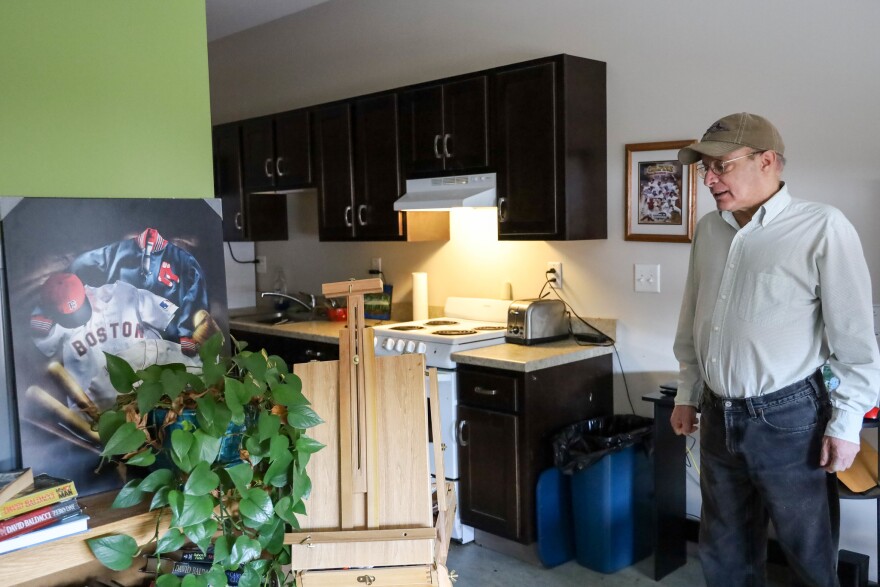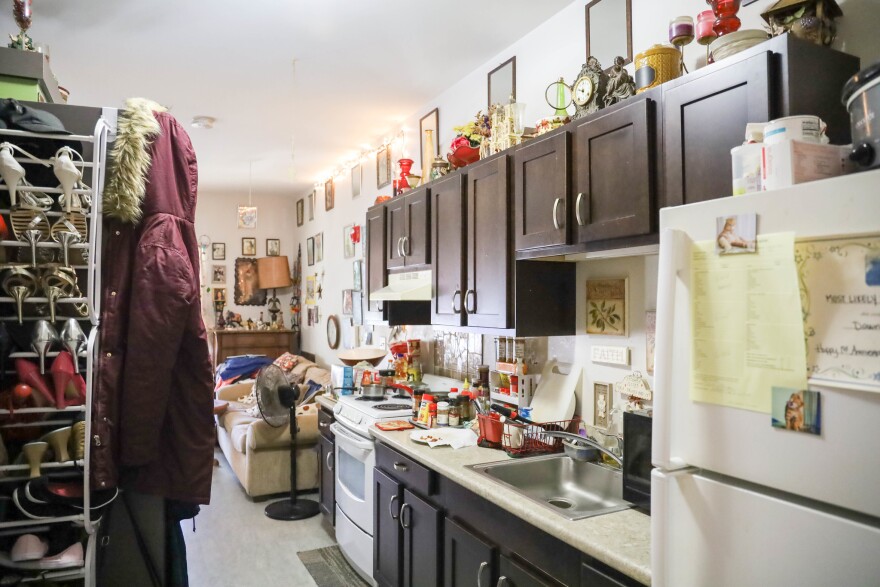Homelessness is a growing problem around the country, including here in Maine.

Portland is currently working through the long and contentious process of building a new emergency shelter where people who are homeless can access services and stay on a night-by-night basis until they are able to move on.
But for about 20 percent of the homeless population emergency shelters or longer-term solutions that mandate counseling or sobriety just don't work.
For this population, a new approach has emerged: low-barrier, permanent housing with no strings attached. It's called "Housing First" and experts say that as part of a larger strategy, it can save lives — and in many cases, money.

Dawn Wade's apartment at Huston Commons in Portland is small, cozy and packed with art, family photos and a 32-pound black and gray cat named Jupiter. But Wade and Jupiter haven't always lived together. For about four years Wade was homeless, living on and off the streets in Maine and Massachusetts. She had to rely on friends to take Jupiter in.
“I had lost a few jobs, my mental illness got worse through the years, my life was falling apart, I couldn't keep a job,” Wade says.

She sometimes stayed at Portland's homeless shelter, but she says it was hard.
“It's kind of scary sometimes,” she says “The drugs, the stealing, the ODs, not being able to sleep at night because people are talking, in and out of their bags with the plastic noise, carrying bags everywhere you went, those bags get heavy.”
Wade says her life now is very different.
“I could take a shower anytime I want,” she says. “Eat my own food, take a nap in the day. I wake up at two or three in the morning, you know, instead of like a normal person gets up at seven. I like to hear the birds in the morning look out my window and have peace of mind before everybody else comes to, but it's the blessing of knowing that every day I'm safe, you know, I'm secure.”
Wade is part of the homeless population that's considered most vulnerable — the 20 percent who are sick, have mental health problems or who are addicted to alcohol or drugs. Advocates say these people are the least likely to do well with requirements, like sobriety or medication compliance. And they're the most likely to use emergency services and to die while living on the street.
“What we were getting exhausted by emotionally, physically and spiritually was putting on memorial services for people we'd known for years who'd died on the streets,” says Mark Swann, the executive director of Preble Street.

Swann has been working with homeless people in Portland since 1991. He says that after years of using an approach that required people to meet certain benchmarks before they could get housing aid, he and his colleagues decided to try something new in the early 2000s. And he says the deaths of chronically homeless people — who he and his colleagues knew well — were a major motivation.
“We said we have to do something different, we have to do something better than putting on these sad little memorial services in a soup kitchen.”
Housing First is exactly what it sounds like: the idea is that people do better when they have permanent housing — and then are more likely to access services like counseling and rehab.
For some, this approach seemed counterintuitive — like rewarding those who can't stay sober, or reliably take their medications with a place to live. But the traditional strategy clearly wasn't working either.
So Preble Street worked with the affordable housing developer Avesta and the Portland Housing Authority to create a Housing First building complex. Logan Place opened in 2005 with 30 units.
“There was a lot of skepticism, it was a big risk for all three organizations, we talk all the time that it was a transformational moment for this agency literally the night it opened,” says Swann.
Swann has called that night the best of his career. And today Preble Street operates three similar residences that provide permanent housing and services for 85 people who were once chronically homeless.
Gil Gagne is one example. At Huston Commons, he paints five hours a day.

“It makes me relax,” Gagne says. “I suffer from PTSD and severe anxiety, and my psychiatrist told me if I painted 5 hours a day I wouldn't have to take medication.”
When Gagne was homeless, he says he spent many nights at Portland's shelter, which is often overcrowded.
“When you have PTSD and you wake up with someone's arm across your chest, it kind of messes up your whole day,” he says.

And the continual stress of homelessness makes it hard for people like Gagne to survive on the streets.
But there are hundreds of individuals like him, and spots for housing-first units are limited. So when one opens up, a committee whose members work with chronically homeless clients meets to go through a list of names of those who could benefit from stable housing.
Swann says it's a brutal process.
“It feels almost like playing God. If you don't get one of those 30 units, it hurts our heart because we think that we might not be able to help that person and they may lose their life.”
Originally published 4:47 p.m. Feb. 7, 2020


